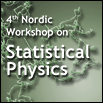Speaker
Dr
Martin Linden
(Stockholm University, DBB/CBR)
Description
Single molecule experiments opens new windows to molecular
biology and biophysics, by allowing us to follow individual
proteins at work in real time. However, instrumental
artifacts and the inherent randomness of Brownian motion and
low copy number chemistry often makes for noisy data that
can be challenging to interpret.
A very common problem is to analyze noisy time series with
abrupt changes, reflecting for example binding events, or
conformational changes in a protein complex. I will describe
an approach to tackle such problems using physical modeling
and a Bayesian version of mean field theory, and show
results for two techniques that use diffusive motion as a
reporter on the underlying chemical or conformational
state: single particle tracking of fluorescent proteins in
vivo, and DNA looping experiments using tethered particle
motion in vitro.

